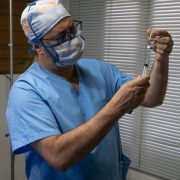Washington Cancer Institute | Mesothelioma Cancer Centers
At the Washington Cancer Institute (WCI), doctors employ a philosophy that puts the patient first. This approach to cancer care includes a personalized treatment regimen that has placed the institution at the forefront of American cancer care; it is commonly seen as the top cancer care location in the D.C. area.
Washington Cancer Institute has been at the front lines of cancer diagnosis and treatment since its conception in 1992. The WCI has also become a world-wide model for multidisciplinary, integrative cancer treatment centers.
Those patients suffering from asbestos-related conditions are given access to an immense amount of cutting-edge therapies and technologies at the Washington Cancer Institute. Dr. Paul Sugarbaker, a world-renown physician in the treatment of peritoneal mesothelioma, is available for those patients who require his assistance. At the institute’s Lung Cancer Center, lung cancer patients can attend weekly discussions with a cancer care team that has been specifically selected for each individual patient.
On top of its impressively developed departments in the fields of radiation, surgical, and medical oncology, there are eleven site-specific care centers at the Washington Cancer Institute. The WCI also includes a specifically designated, comprehensive pain center. It is a member of the MedStar Washington Hospital Center, which is one of the fifty and most well-versed hospitals in the entire country.
The WCI has been recognized by the American Society of Clinical Oncology’s Quality Oncology Practice Initiative Certification Program; it was one of the very first institutions to receive their certification. Every single year, the cancer center diagnoses over one-thousand four-hundred new cancer cases and provides services to more than seventy-thousand outpatients.
Mesothelioma at WCI
The approach to treatment at the Washington Cancer Institute is totally integrative and patient-centered. Those suffering from peritoneal, pleural, and other forms of mesothelioma are give a consultation with a team of world-class physicians in order to discuss an effective treatment regimen. For these diseases, treatment typically employs a multimodal approach, including a combination of radiation therapy, chemotherapy, surgery, and supportive care.
The cancer center instituted the Peritoneal Surface Malignancies program in 1993 in order to better serve those suffering from mesothelioma and other difficult cancers that arise in the pelvis and abdomen. Although the outcomes of these ailments have historically been associated with short life-expectancies, patients at the Washington Cancer Institute have the benefit of access to Dr. Paul Sugarbaker, the director of the Peritoneal Surface Malignancies program and surgical oncologist. Dr. Sugarbaker is commonly seen as one of the world’s most qualified experts in the therapy of peritoneal surface malignancies.
He has been studying and treating rare forms of abdominal cancer for more than thirty years. Pioneering countless novel treatments, Dr. Sugarbaker has changed the face of cancer care for generations to come.
One such treatment he developed is the Sugarbaker procedure, which is comprised of cytoreductive surgery along with hyperthermic intraperitoneal chemotherapy (also known as HIPEC).
Utilizing the Sugarbaker procedure, there have been over three-hundred peritoneal mesothelioma patients treated at the Washington Cancer Institute and three other cancer centers worldwide. Although the disease is associated with a life expectancy of about a year or less, those who have been treated with Sugarbaker’s procedure at these centers experience a mean survival expectation of five years or possibly longer.
The physicians working at the Washington Cancer Institute have drafted a thorough, logical approach towards determining who the best candidates for the Peritoneal Surface Malignancies are. Their first goal is presurgical screening, after which a group of physicians examine the patient’s imaging scans and other statistics before an intimate meeting with the doctors. Second, a surgical oncologist meets with the patient at the Washington Cancer Institute’s Oncology Specialty Center (OSC).
In the period that follows, a team of doctors will explain the diagnosis to the cancer patient that was derived from the imaging scans; the physicians then explain what the best treatment regimen is. The meeting between the professionals and patient also includes a physical examination. Before the surgery can be underway, each patient must have a surgical evaluation, which is also referred to as a diagnostic workup.
This process includes further testing, such as a heart test, blood test, and more imaging scans, patient education, and finally, a meeting with an enterostomal therapist. After the surgery is complete, patients spend an average of twenty-one days before they are fit and recovered.
Lung Cancer at WCI
Patients that have been diagnosed with lung cancer are able to seek treatment at the Washington Cancer Institute’s Lung Cancer Center. Patients are given the luxury of meeting all members of their cancer care group in a single meeting and space. Depending on each patient’s individual requirements, the group of specialists might include nutritionists, lung pathologists, radiation oncologists, radiologists, medical oncologists, surgeons, nutritionists, and other supporting staff members.
Seeing as the three most common types of treatments for lung cancer are chemotherapy, radiation therapy, and surgery, the doctors in these particular specialties must coordinate in order to provide the best treatment possible. At Washington Cancer Institute’s Lung Cancer Center, patients are able to establish communication with all of their physicians in one location. Physicians are able to inform patients about the details of their treatments and inquiries in a regular weekly meeting.
Clinical Trials and Research
The Washington Cancer Institute maintains a visceral connection to research that not only brings world-class therapies to the center’s patients, but also advances the overall quality of cancer treatment and its related fields around the world. The progression of cancer therapies relies on the successes of past clinical trials. Physicians at the cancer center suggest patients should participate in the clinical trials; these trials intend to determine the effectiveness and safety of new techniques, pharmaceuticals, or combinations of the two.
